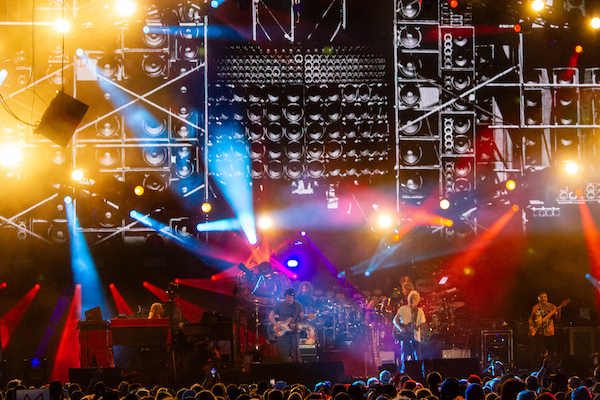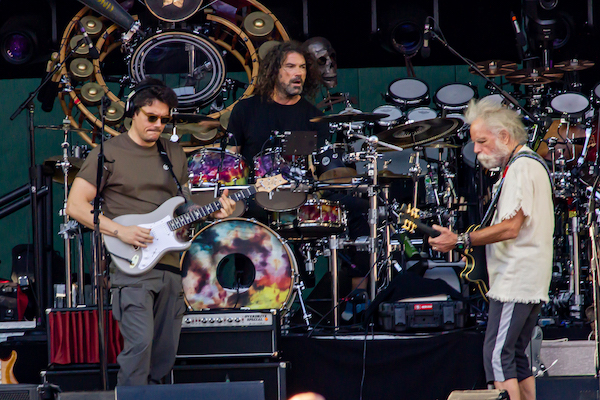Concert Review: Dead & Company’s “Final Tour” at Fenway — Into Uncharted Territory on Saturday
By Scott McLennan
There was nothing sloppy about the band’s searching and probing: the members of Dead & Company were perfectly locked into each other, were enjoying the musical exchanges being made in the moment.
Dead & Company, Saturday, June 24 at Fenway

Dead & Company at Fenway. Photo: Sam McLennan
That old adage about New England weather — you know, just wait 15 minutes and it will change — never felt truer than when Dead & Company played at Fenway Park in Boston on Saturday.
Rain fell steadily during the day before the start of the first concert of a two-night Fenway stand that is part of Dead & Company’s “last tour.” By showtime, though, the skies cleared for a gorgeous night. Similarly, Dead &Company’s first set on Saturday felt more serviceable than inspirational. But returning from break, the band delivered a second set that was lively, unpredictable, and ultimately dazzling.
Dead and Company formed in 2015 with blues-pop guitar idol John Mayer joining original Grateful Dead members guitarist Bob Weir and drummers Mickey Hart and Bill Kreutzmann along with longtime Weir collaborator Jeff Chimenti on keyboards and bass player Oteil Burbridge.
There’s no doubt that Dead & Company has enjoyed more commercial success than other iterations of bands formed by members of the Grateful Dead following the death of Jerry Garcia in 1995.
But artistically, Dead & Company has had its challenges. The band hasn’t created any new material, though it does perform songs that were long shelved when Garcia has been the driving force in the Grateful Dead. But Dead & Company typically smooths the edges of Grateful Dead music: the tempos are slower and bring a more orchestrated approach to a body of work that had been propelled by a healthy appetite for improvisation. In fact,there is speculation that Kreutzmann’s departure from the band, right before the start of this tour, was motivated by Dead & Company’s diminished sense of adventure.
It would be hard to argue that premise after Dead and Company’s first set on Saturday.
With drummer Jay Lane from Weir’s solo bands taking Kreutzmann’s place, Dead & Company opened Saturday with a long, meditative read of “Cassidy,” seemingly stretched out to allow time for thousands of concertgoers to navigate their way to seats in the ballpark.
From there, songs spotlit the various textures of the Grateful Dead’s music: a country groove drove “Brown-Eyed Women”; the tumbling rock ’n’ roll of “I Need a Miracle” followed; and the jazzier side of the Dead emerged on “Here Comes Sunshine.”
The songs all featured nice playing and some solid solos by Mayer and Chimenti, with Weir leaning into the crackling metallic tone of his distinct brand of rhythm work. The keyboard player also stood out on the chugging “Tennessee Jed.” But nothing really veered from a scripted, albeit crowd-pleasing, approach.
Burbridge, who plays with unbridled enthusiasm, did a beautiful job singing the Garcia-associated ballad “China Doll.” But this delicate piece, complete with a lovely crystalline solo from Mayer, was ill-placed in a show that was still looking for real lift-off.
The psychedelic blues gem “Viola Lee Blues,” a number that dates back to the earliest days of the Grateful Dead, usually provides that sort of fuel. Yet on Saturday this tune didn’t catch on fire either. It was probably cut short once the band realized it needed to wrap up things if it wanted to take a break and have sufficient time for its second set without running afoul of Fenway’s curfew.
So, rather than stretch out the “Viola Lee,” Dead & Company stuck to its planned setlist and played “Music Never Stopped.” Weir’s voice seemed strained as he worked through this signature piece of his. The set ended: not a disappointment, but neither could it be called a triumph.

Dead & Company at Fenway. L-R: John Mayer, Jay Lane, Bob Weir. Photo: Sam McLennan
The band members must have used the set break to knock back some mojo shots, because they returned a different group altogether.
“New Speedway Boogie” was the opener and, like “Viola Lee,” the tune blends the traditional and experimental. In this performance, the band took full advantage of the alchemy. Dead & Company interlaced big ensemble swells with fiery solos — the song’s dynamics were pushed and pulled to great effect.
The band then went further out into musical space with the psychedelic opus “Dark Star.” A long, relaxed passage of jamming unfolded before Weir hit the song’s first verse. The band didn’t finish that number before a swirl of ensemble improvisation solidified into “The Other One,” another psychedelic-era staple which, like “Dark Star,” trailed off before ever reaching its second verse.
The listlessness of the first set was obliterated by this point. The musicians were superbly playing off of each other, confidently taking these songs — and the crowd– into uncharted territory: full Grateful Dead was in effect.
That guided ramble masterfully led to the epic “Terrapin Station.” The band hit all of the transitions precisely in this Robert Hunter-penned fable about fate, choices, and mystery.
Hart, Burbridge, and Lane then tackled the concert’s traditional drums segment. Upon Kreutzmann’s departure, Hart seems to have taken a more prominent role in showcasing the primal-futuristic fusion of the Dead’s percussive soundscapes.
When the rest of the band returned, the concert hit its peak. The fluid jam after the drums segment is standard operating procedure for Dead & Company. But, rather than build into the next song, the jam just kept going and going, offering Bakersfield-country elements that sounded as if at any minute the song could turn into Johnny Cash’s “Big River,” Bob Dylan’s “Maggie’s Farm” or the Dead’s own “Cumberland Blues.” None of those arrived. Instead, the strains of “Dark Star” returned, blended into the country music motifs that were still bubbling in the mix.
This mix and match went on for several minutes before leading back into “The Other One,” though its second verse is still dangling out in the universe, somewhere.
There was nothing sloppy about this searching and probing: the band members were perfectly locked into each other, each enjoying the musical exchanges being made in the moment. This was an exhilarating sequence that sounded totally fresh: it was a celebration of this band’s roots as the house band for LSD dance parties.
For those patiently waiting for a “real song,” the band finally got around to playing “Black Peter.” Unlike the first set’s “China Doll,” this ballad felt properly big and propulsive. Mayer especially dug into the bluesy riffs, at times quoting the signature lick from Ray Charles’ version of Harlan Howard’s “Busted.”
Mayer also shined when he led the band through “Casey Jones,” actually jacking up the tempos compared to the Dead’s original and dashing off solos reminiscent of Steve Winwood’s guitar work with Traffic. Weir provided the last word, doing his signature Saturday night closer, “One More Saturday Night.” Unfortunately, poor clock management forced the band to end there and forgo the traditional encore. In a way though, blowing the script was probably among the most Grateful Dead things that the Dead & Company did.
Dead & Company, Sunday Night at Fenway
Scott McLennan covered music for the Worcester Telegram & Gazette from 1993 to 2008. He then contributed music reviews and features to the Boston Globe, Providence Journal, Portland Press Herald, and WGBH, as well as to the Arts Fuse. He also operated the NE Metal blog to provide in-depth coverage of the region’s heavy metal scene.

Love your review!
Great review. Thank you.